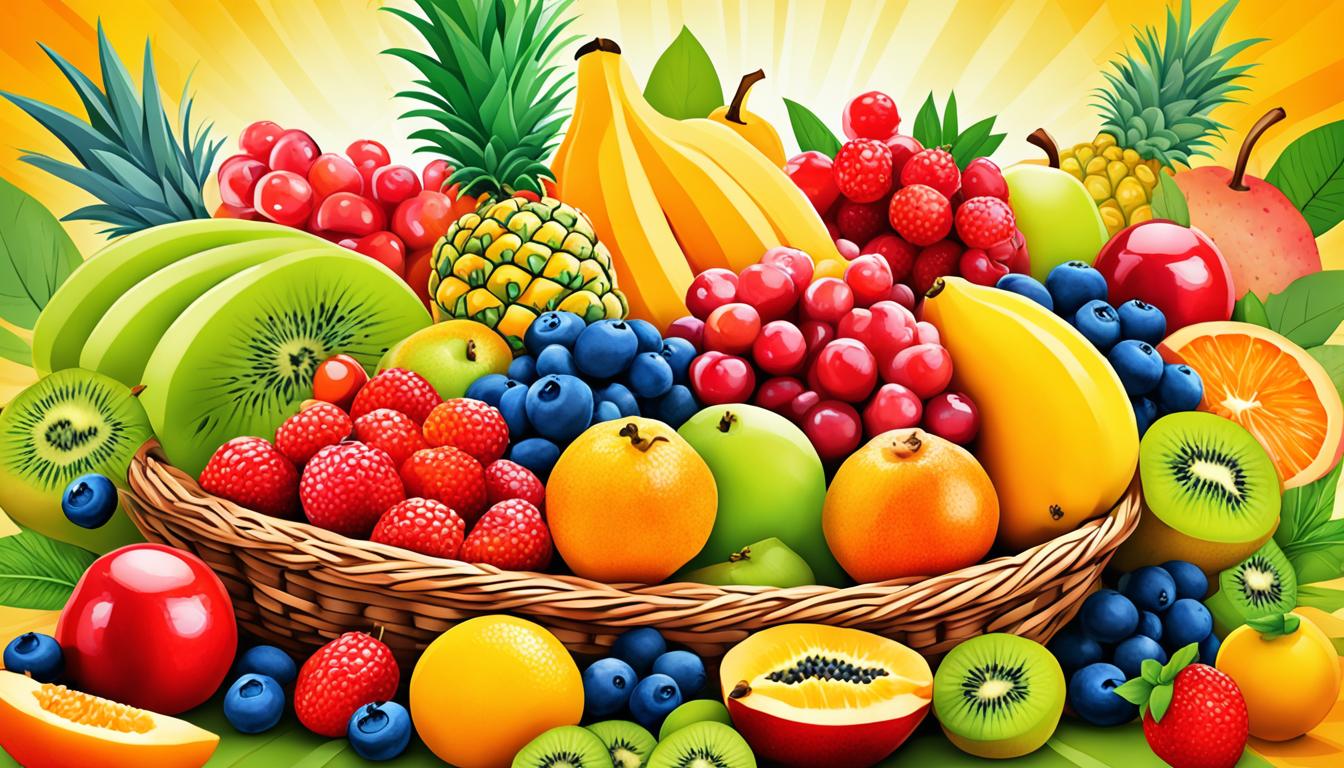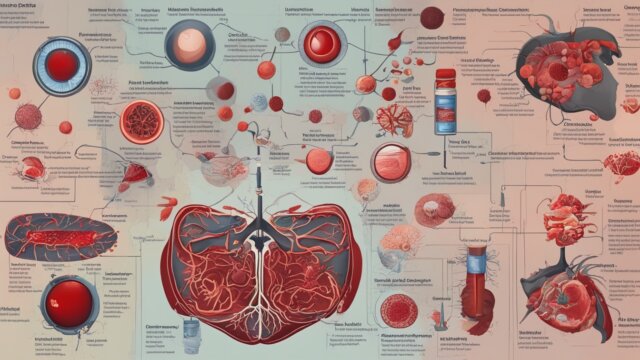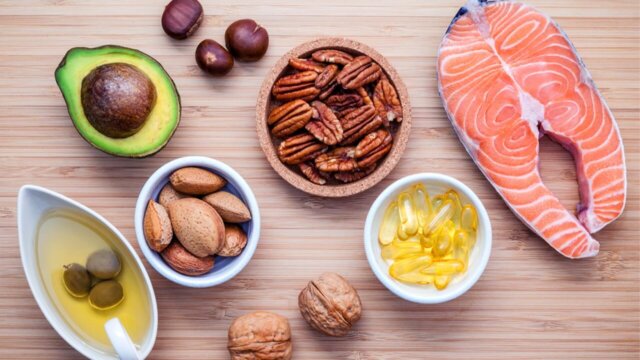FTC disclaimer: This post may contains affiliate links and we will be compensated if you click on a link and make a purchase.
Digestive issues like gas, constipation, and diarrhea are common. In the West, 15 percent of people suffer from a severe type called irritable bowel syndrome (IBS). Our health and digestion are closely connected. Fruits, rich in dietary fibers, natural enzymes, and antioxidants, greatly benefit our digestive system. They support healthy digestion, which in turn, improves our overall health naturally.
Key Takeaways:
- Fruits are rich in fiber, enzymes, and antioxidants that support digestive health
- Certain fruits like apples, bananas, and berries can help manage common digestive issues
- Incorporating a variety of fruits into your diet can naturally enhance gut health and overall wellness
- Moderation is key when consuming high-fiber or high-fat fruits to avoid potential digestive discomfort
- Choosing organic fruits can help minimize exposure to pesticides that may negatively impact digestion
Importance of Gut Health
Our digestive system is often called the powerhouse of our body. It is key to our well-being. It breaks down foods and takes in important nutrients. Our immune system gets help and waste gets managed. But, many have issues like bloating, gas, and constipation. These can lower the quality of our daily lives.
Absorbing Essential Nutrients
A healthy digestive system is needed to take in important vitamins and minerals. This helps keep us healthy and supports our body in many ways.
Supporting Immune System
About 70% of the cells that fight germs are in our gut’s lining. So, keeping our gut healthy helps our immune system work better. This lowers our chances of getting sick.
Managing Waste Effectively
Our gut clears away waste and toxins well. But, if this process doesn’t work right, it can hurt our health. Keeping waste under control is key for our health.
How Fruits Aid in Digestion
Good digestive health is important for feeling well. Fruits play a big part in this. Foods like apples, oranges, and bananas have a lot of fiber. This helps our stomach work better because it has enzymes and fiber.
Dietary Fibers
Dietary fibers in apples are very helpful. They can lower bloating and make going to the bathroom easier. This keeps our stomach healthy. Figs are also good for digestion because they are full of fiber.
Natural Enzymes
Natural enzymes in fruits make digestion easier too. Papaya has an enzyme called papain that helps digest proteins better. Pineapples have bromelain which is good for protein digestion and lessens stomach swelling. Mangoes contain amylase which is great for breaking down carbohydrates and helping digestion.
Antioxidants
Fruits have a lot of antioxidants that are good for our stomach. Berries, like strawberries and blueberries, have lots of antioxidants. They keep our digestive system healthy and fight off sickness. Kiwi is helpful too with its actinidin enzyme. It’s good for the immune and digestive systems.
Eating fruits with other foods that are good for digestion, like whole grains, probiotics, and nuts, gives us the best results. Also, paying attention to how our body reacts and eating fruits in the right amounts is key to better digestion and health.
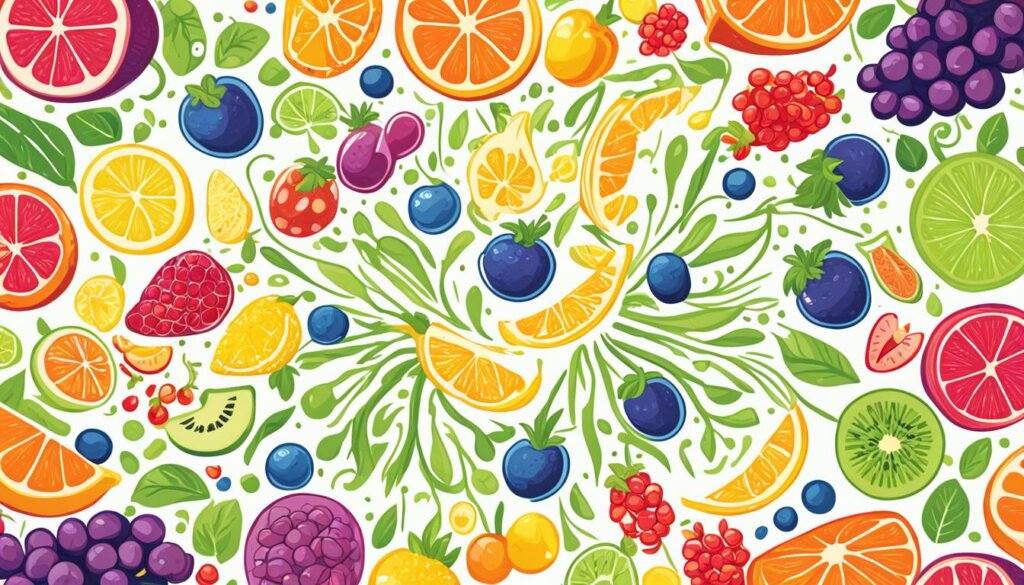
Apples: The Digestive Powerhouse
An apple is like nature’s candy, full of soluble fiber. Soluble fiber, like pectin in apples, does so much good. It can lower bloating risk and keep your digestive system running smoothly. Apples also help your gut have the right kind of bacteria, making sure your whole digestive system stays healthy.
Rich in Soluble Fiber
Apples have lots of soluble fiber, especially pectin. Pectin helps with bloating and makes going to the bathroom easier. A single apple only has about 60 calories, making it a perfect low-calorie snack. Eating 3 ounces of dried apples daily, without sugar added, cut down total cholesterol by 13% in six months for folks in a study.
Balancing Gut Microbiome
Apples also help keep your gut’s microscopic world balanced.
This means good bacteria gets to thrive, improving your gut health overall. A big study found that eating more than one apple per day lowered the risk of getting Type 2 diabetes by 28%, compared to not eating apples.
Another study with 77,000 people showed that eating one apple daily could lower the risk of lung cancer. And a study with almost 40,000 folks found that apple eaters were 13% to 22% less likely to get heart disease than those who didn’t eat apples.
Bananas: The Gentle Gut Soother
Bananas are loved all over for their effects on ourdigestive health. They’re packed with vitamin C, potassium, and much more that boost our well-being. These goodies are more than a tasty snack. They’re full of benefits, like inulin, a type of fiber that helps good bacteria grow in our gut.
Vitamin C and Potassium
These fruits are a top spot for getting vitamin C and potassium. These nutrients are key for a healthy gut and strong immunity. Potassium, in particular, can keep our fluids in balance, making going to the bathroom easier.
Inulin for Beneficial Bacteria
Bananas shine in the prebiotic fiber department, being rich in inulin. Inulin feeds our gut’s friendly bacteria, helping them thrive. This growth boosts digestion, better nutrient absorption, and improves our overall gut health. With their fiber, vitamins, and minerals combo, bananas are a true friend to our digestive tracts.

Papaya, Pineapples, Cherries – Aids in Digestion
Some fruits are great for keeping our stomachs healthy. Papaya is full of an enzyme called papain. This enzyme helps us digest proteins better. Another fruit, pineapples, has bromelain. Bromelain is an enzyme that also helps break down proteins. This can lower the chances of having a sore stomach.
Papaya and Papain
Papaya stands out for its benefits in digestion. It has a special enzyme, papain, that improves how we digest food. By breaking down proteins, it makes it easier for our bodies to get the nutrients they need. Adding papaya to your meals could really help those who have trouble with their digestion.
Pineapples and Bromelain
Pineapples help a lot with digestion too. They’re packed with bromelain. Bromelain breaks down protein, which can calm an upset stomach. Eating pineapples often might just be the key to a happier digestive system.
Berries’ Antioxidant Power
Berries from the farm or the bush are full of good things. Strawberries, blueberries, raspberries, and even cherries are packed with antioxidants. These antioxidants can help keep our stomachs from getting inflamed. They’re also full of nutrients that keep our whole body healthy and well.
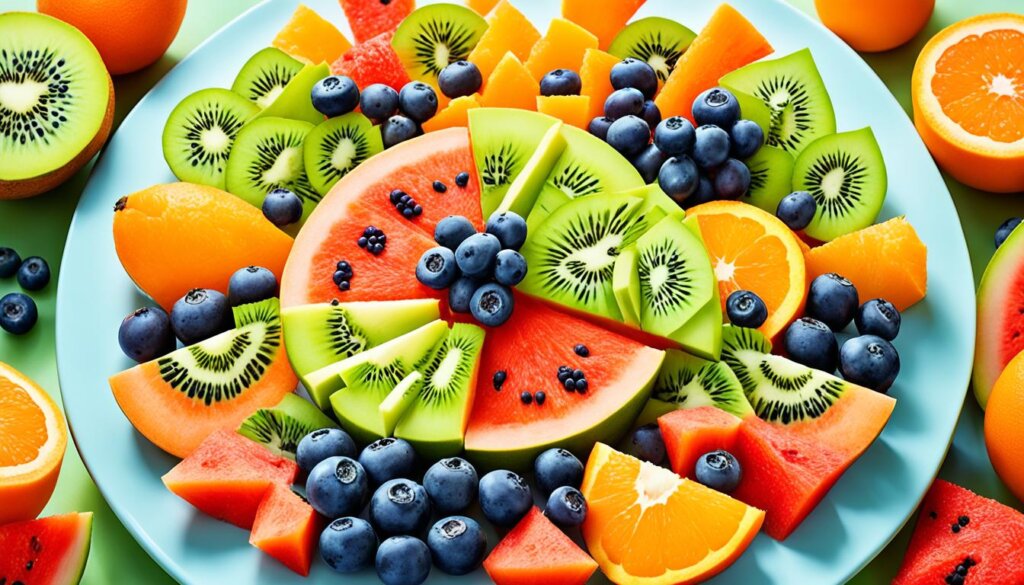
Kiwi: A Hidden Gem
The kiwi is often overlooked in regular fruit diets. Yet, it’s full of actinidin, a helpful digestive enzyme. Actinidin boosts how we digest proteins and move food through our gut. Eating kiwis regularly is great for our immune and digestive systems.
Actinidin Enzyme
Kiwis have actinidin, which helps our immune and digestion. This special enzyme makes our gut work better, leading to improved digestion and getting more nutrients.
Immune System Support
Kiwis provide over 230 percent of the needed Vitamin C each day, key for the immune system. They are also packed with antioxidants fighting off free radicals. This helps lower oxidative stress, making our immune system stronger.
Kids who eat kiwis may see less wheezing with asthma. This shows how kiwis help with different health issues, not just the immune system.

Watermelon: The Hydration Power
Watermelons are full of water, so they help you stay hydrated and aid digestion. They have lots of water, which is good for daily water needs. A 1-cup serving of diced watermelon has about: 46 calories, 11.5 grams of carbs, and more. Plus, they have vitamins and minerals that are great for your health, making them perfect for summer snacks.

Watermelon is mostly water, about 90%. This is great for keeping hydrated in summer. But, only a small number of people eat enough fruit each day, CDC says. Watermelon has antioxidants like lycopene, which can lower inflammation and damage over time. These antioxidants can fight against harmful free radicals, which are linked to diseases like diabetes and heart disease. Lycopene in watermelon might also lower cholesterol and blood pressure, good for your heart.
One cup of watermelon balls has 12.5 mg of vitamin C. This meets about 16% of what you need daily. And, C vitamin helps your immune system stay strong. Watermelon also gives you potassium, magnesium, and vitamins A and C. There’s citrulline in it too, which can help you do better in sports and feel less sore afterwards. Its water and fiber are great for digestion.
Figs: Nature’s Laxative
Figs, both fresh and dried, help our stomachs work well. They stand out because they help us go to the bathroom. Figs are good for us because they are full of fiber.
They keep our stomachs healthy and offer lots of other good things for our bodies too.
Rich in Fiber
Dried figs are like fresh ones but smaller because they’re dried. This means they could have more sugar and calories. But, they’re still great for digestion because of the fiber they have.
Studies have shown that eating dried figs can help people with stomach problems feel better. For example, eating 4 dried figs twice a day helped 150 people with their stomach pain and bloating.
A different study found that eating fig fruit paste for 8 weeks helped 80 people with constipation.
Nutritional Profile
Figs might help with blood pressure, according to one rat study. They could also make sugary drinks better for our blood sugar if they have fig extract in them.
In lab tests, figs showed they could fight some cancers. And, a special cream made from figs worked better for children’s skin problems than regular cream.
But, eating too many figs might upset our stomachs or make us go to the bathroom too much. They could also mess with our blood if we take blood thinners. Still, the good things about figs for our health are more important.
Avocado: The Gut Health Superstar
Avocados aren’t just a cool thing to put on toast. They are packed with healthy fats that help with digestion. They also have vitamin C, potassium, and fatty acids for overall health.
Healthy Fats
Avocados have lots of monounsaturated fats. These fats help our bodies better use vitamins and minerals. This is good for our gut’s health.
Vitamin C and Potassium
Avocados also give us a good amount of vitamin C and potassium. These help keep our immune system strong. They also aid in digestion and other body processes.
Mangoes: The Tropical Digestive Aid
Mangoes are known as the king of fruits. They truly help with digestion. This is because they contain an enzyme known as amylase. Amylase is key in breaking down carbs, making digestion better. Eating mangoes regularly doesn’t only benefit digestion. It also boosts your overall health.
Amylase Enzyme
Mangoes’ digestive benefit is thanks to amylase. Amylase helps in turning complex carbs into simple sugars. This change makes it easier for our bodies to digest. It helps lessen issues like bloating and gas.
Overall Wellness Enhancement
Mangoes aren’t just good for digestion. They are also full of vitamins, minerals, and antioxidants. These support a strong immune system and heart health. Including mangoes in your diet can really change your health.
Balanced Fruit Intake
Fruits are amazing for our health, but we need to eat them in balance. Too much of some fruits might lead to tummy issues, like bloating or gas. Apples, pears, and mango can cause this, being high in fructose. Listening to your body is key. This helps in finding the fruit balance that suits you best.
Listening to Body’s Signals
It’s important to listen to what our body tells us about fruits. If you feel bloated or gassy after eating certain fruits, it might mean you need a change. Berries, citrus fruits, and bananas are kinds that are usually easier on the stomach. This means you might need to pick fruits carefully to keep your digestive system happy.
Finding the Right Balance
Finding the right fruit mix is about trying different things and paying attention to how you feel. Start by adding various fruits to your meals. Apples, oranges, and bananas help keep digestion running smoothly. Yet, berries are famous for their gut-strengthening antioxidants.
For instance, a cup of raspberries packs 8 grams of fiber. This is almost a third of what most people need daily. Tailor your fruit intake as needed. Trying new fruits is okay. It might just help you find the perfect fruit mix for your health.
The Colorful World of Fruits
Every fruit is like a little world of its own. They each have unique stories or nutrients. Think of strawberries that are bright red or bananas that are smooth yellow.
Adding different fruits to your meals makes eating fun. It also gives your body a mix of vitamins, minerals, and enzymes. Eating organic fruits, especially those with eatable skins, is good for your stomach.
Variety of Nutrients
Fruits offer us a wide range of tastes and nutrients. For instance, avocados have good fats. Papayas have enzymes that are good for digestion. Eating various fruits keeps your body happy and healthy. You get fiber, vitamins, minerals, and antioxidants. These are key for good digestion and health.
Choosing Organic
Choosing organic fruits is better for you, especially for your gut. Organic farmers don’t use many chemicals that harm your gut’s balance. By picking organic fruits, including those with skins you can eat, you choose purer and nutrient-rich options. It’s like a gift for your digestive system.
Conclusion
The fruits we can enjoy are more than just tasty. They help our digestion and keep us healthy. Using fruits rich in fiber, enzymes, and antioxidants can boost your gut health and make you feel better. Add these fruits to your meals, such as in salads, snacks, or smoothies, and feel the difference.
Eating the right amount of fruit is key to not having tummy problems like bloating. Combine fruits with whole grains and probiotics to make them even better for you.
Picking organic fruits means less pesticides for your health. Don’t forget to drink plenty of water with your fruits. This helps you digest better. Also, eating a range of fruits gives you a good mix of vitamins, minerals, and enzymes, which is great for your well-being.
When you enjoy fruits, you get important nutrients that also keep your stomach happy. A diet filled with different fruits helps your digestion and keeps things moving as they should. For example, fruits like oranges, which are high in fiber, help a lot.
So, by welcoming these colorful, nutrient-rich fruits into your diet, you’re taking steps towards a healthier gut and a happier you.
FAQ
What are the best fruits for improving digestive health?
For good digestion, try apples, bananas, and some tropical fruits. These include papaya, pineapples, also berries and kiwi. Watermelon, figs, avocado, and mangoes are great too. They are full of fiber, enzymes, and antioxidants for a healthy gut.
How do fruits aid in digestion?
Fruits help with digestion thanks to their fiber and enzymes. Fiber keeps your belly balanced. Enzymes like papain in papaya and bromelain in pineapples break down food. This helps your body use nutrients better.
Why is gut health important for overall well-being?
Gut health ties to our health in many ways. It helps our body absorb good stuff, fight sickness, and flush out waste. Taking care of your gut makes you feel better all over.
How do apples benefit digestive health?
Apples are full of soluble fiber which helps ease bloating. They also work well with your gut’s good bacteria. This all leads to a happier tummy.
What makes bananas a gut-friendly fruit?
Bananas help your tummy with vitamins, minerals, and friendly fiber. They’re good for feeding the helpful bacteria in your gut.
What enzymes in fruits aid digestion?
Papaya has papain to break down proteins and make digestion easier. Pineapples offer bromelain which cuts down on gut inflammation. Both fruits are good for your belly.
How do berries benefit the digestive system?
Berries are full of antioxidants that help your gut stay healthy. They’re also low in calories but high in vitamins. Eating them can boost your overall health.
What makes kiwi a hidden gem for gut health?
Kiwi has actinidin which helps your body digest proteins. This helps keep your gut strong and your immune system healthy.
How does watermelon support digestion?
Watermelon is mostly water, which keeps you hydrated. It’s rich in vitamins and minerals too. This is all good for your digestion and general well-being.
What are the digestive benefits of figs?
Figs help keep digestion in check due to their high fiber content. They maintain a healthy gut and bring a lot of other health perks.
How do avocados support digestive health?
Avocados bring healthy fats and lots of nutrients to the table. They’re great for digestion and offer many other health benefits as well.
What role do mangoes play in improving digestion?
Mangoes contain amylase to help digest carbs. They do wonders for your belly and your health in general.
How can I balance my fruit intake for optimal digestive health?
Listen to your body when choosing how much fruit to eat. Enjoy them in moderation to avoid stomach issues like bloating.
What are the benefits of choosing organic fruits for digestive health?
Organic fruits are grown without harmful chemicals, making them good for your gut. They’re also packed with more nutrients and antioxidants.
